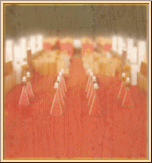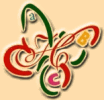(HALL 3.0)
 t
happens for the first time in the history of the Frankfurt Book
Fair that the main guest country presents its pavilion, the
site of the country's self-presentation and its publishing companies
on the same ground. Hall 3.0 will host the Hall of Hungary for
the duration of the Book Fair and it provides a nuclear meeting place
and information centre for those interested in Hungarian literature
and art. Hungarian cuisine will also be presented here. A Hungarian
restaurant and an authentic "Budapest Café" will offer a large
selection of interesting and abundant Hungarian specialities
to the visitors.
t
happens for the first time in the history of the Frankfurt Book
Fair that the main guest country presents its pavilion, the
site of the country's self-presentation and its publishing companies
on the same ground. Hall 3.0 will host the Hall of Hungary for
the duration of the Book Fair and it provides a nuclear meeting place
and information centre for those interested in Hungarian literature
and art. Hungarian cuisine will also be presented here. A Hungarian
restaurant and an authentic "Budapest Café" will offer a large
selection of interesting and abundant Hungarian specialities
to the visitors.

Hall 3.0 was designed by Dezső Ekler and István Ferencz and it will serve as a fair setting for a number of exhibitions with its total area of 5.300 square metres. Among others the statues of 12 prominent Hungarian scientists and artists will be on show, representing several particular fields of art and culture. Music, for example, will be represented by Béla Bartók, literature by Attila József and medical science by Ignác Semmelweis. The reamaining fields and personalities are as follows:
Book Publishing: Miklós Misztótfalusi Kis
Religion and Education: Péter Pázmány
Mathematics: János Neumann
Agronomy: Sámuel Tessedik
Fine Arts: Tivadar Csontváry Kosztka
Discoveries: Sándor Kőrösi Csoma
Law and Economics: István Széchenyi
Military History and Architecture: János Hunyadi
Natural Sciences: Albert Szent-Györgyi
The exhibition of Fine Hungarian Books follows the aesthetic development of fine books from the turn of the century to 1980. The books of Elek Falus, Lajos Kozma, Anna Lesznai and József Rippl-Rónai will be available just as the works of Tibor Szántó. Illustrators will also be represented by, for example, the works of János Kass, Dóra Maurer or Róbert Swierkiewicz.
The exhibition on the history of science praising great Hungarian inventors and innovations. The scope of the exhibition reaches from György Ligeti, Sámuel Teleki and Péter Zwack to Vilmos Zsolnay and Arnold Hauser. Some important inventions will be illustrated by models, for example Loránd Eötvös's pendulum and Ányos Jedlik's generator. A collection of scientific books printed in the 16th, 17th and 18th centuries in Frankfurt will also be on show.
German - Hungarian Interactions in Book Culture is the title of the exhibition dealing with the activity of German publishing companies functioning in Hungary between the 15th and the 19th century. The chronologically and thematically arranged exhibition extends from András Hess through Theobald Feger and Ratold to Klösz. Printed documents proving the Hungarian scholars' travels to Jena, Halle, Erlangen and Wittenberg will also be displayed. The prohibited books of Wesselényi, Táncsics, Széchenyi or Kossuth, the great characters of the Reform Age that were printed in Leipzich will also be out to study.
Click on the picture!
An exhibition focusing on the country and tourism will introduce the nine regions of Hungary by attractive and high standard books, images and films.
The core of the exhibition presenting Madách is his chief work The Tragedy of Man (Az ember tragédiája) with numerous scenes, illustrations and interpretations.
An interactive music room will also be arranged. Here the audience will acquire a survey history of Hungarian music starting from classical music to pop and rock. The visitors will be seated at a round table and will be able to serve themselves according to their interest and taste, and hence be participants of a musical trip to Hungary. Scores and books will also illustrate the history of music in Hungary.
A further exhibition is entitled Multimedial. Here with the help of overhead projectors, computers and CD-ROMs a virtual trip to Hungary will be realised, also to delight in culture by another "way of seeing".
Books on Hungary is an international exhibition presenting 1500 editions collected by the Frankfurt Book Fair that in some way are all concerned with Hungary.
The intense co-operation with the main theme - countries to follow, that is, Poland and Greece, counts as an innovation, and these countries will also participate in the programmes and shows of Hall 3.0.
 |
Frankfurt '99
Non-profit Organisation,
Budapest 1054 Báthori u. 10. Fax: +(36) 1 269 20 53 E-mail: frankfurt_99.kht@mail.matav.hu |
|